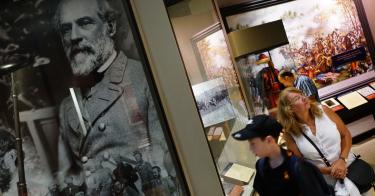Children today face a double whammy when it comes to civic education: Their schools often teach bad curricula and very little civics, and their parents did not learn much, either.
About 4 out of 5 parents with a college degree did not have to take any civics to graduate. That means today’s parents have received a very meager amount of civics that they can share with their children. Therefore, restoring civic health to our country means engaging parents as well as their children.
A lot of parents lately have been motivated to get involved by seeing the low quality of civic education their public schools are offering through online “school.” The 1619 Project's curriculum, for example, focuses on America’s problems instead of the great system of government developed by our nation’s founders in 1787.
>>> 1619 and the Poisoned Well of Identity Politics
Meanwhile, civic education has been on the decline for decades. Only half of U.S. adults in a 2020 survey could name the three branches of the federal government. Amazingly, this is a record high for the decade. Only 39% could name them in 2019, just 32% the year before that, and only 26% in 2017. Similarly, only half of us know that freedom of religion is guaranteed under the First Amendment to the U.S. Constitution. At least that’s better than the 1 in 6 who knew it in 2017. We are on an upward trajectory, even though the actual level of civic knowledge remains dismal.
Those of us who are grandparents got three courses in civics and government. Knowing about America as a free country flourishing under capitalism was critical during the Cold War fight against socialism and the Soviet Union. But over time, we sent civics farther and farther back in line, behind math, reading, science, and, most recently, “critical studies” that look at Americans as warring identity groups instead of as individuals bound by a common heritage of freedom.
The drumbeat of anti-Trump controversies, however, has turned many people back to the Constitution. Is democracy really in crisis or not? How does impeachment work? How can the courts protect our liberties? The language of crisis, like the Cold War, makes many of us want to recenter our identity. We are turning to the Constitution (many of us for the first time) and learning what makes our republic great and worth preserving.
What can we do for our neighbors who are parents, those who want their children to grow up knowing our best traditions and how to form an even more perfect union for the children after them? Parents can now find great alternative resources.
Schoolhouse Rock still holds up, with a healthy perspective on how a government of men, not one of angels, really works.
The lesson plans at 1776 Unites give parents and their children realistic lessons on black history, a real alternative to the divisive 1619 Project.
The engaging new book by Wilfred McClay, Land of Hope, is for parents and children alike. This “invitation to the Great American Story” is an inspiring book about America that the family can read aloud and enjoy together, and it is the perfect antidote to Howard Zinn’s anti-American history that has been adopted in so many classrooms.
>>> Explore: Heritage's Curricula Resource Initiative
Or parents can go straight to America’s top 50 core documents as curated by the Ashbrook Center, which tell America's story from the perspectives of the people who lived it, from the founders through Frederick Douglass to President Ronald Reagan.
If parents have a particular question or interest, they can turn to the Bill of Rights Institute, which has thousands of resources.
And families have tons of opportunities to visit historical sites, battlefields, and museums large and small, such as the National Constitution Center in Philadelphia and the American Revolution Institute in Washington.
It can be a lot of fun for families to learn and discuss our history together. When we know better who we are and where America has been, we can resist those who seek to divide us by insisting, instead, on what unites us. We can debate America's story, warts and all, as Americans.
This piece originally appeared in the Washington Examiner



